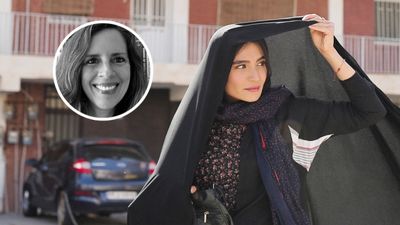In Asghar Farhadi’s films, the institutional boxes his characters live in, seemingly solid structures of any society — justice system, civil law, family, religion — crumble in the face of the complexity of human situation.
His latest brilliant drama, “A Hero,” opens with the protagonist, Rahim, in just such a box, a prison, where he is serving a sentence due to unpaid debt. Upon his two-day release, we watch him ascend, breathlessly, the steep stairs at the Tomb of Xerxes — an apt visual metaphor for a character whose each step on an uphill climb will plunge him deeper into the abyss of irresolvable ethical dilemmas. His selfless act — he decides to return the golden coins found by his friend that were meant to repay some of his debt — unwittingly makes him a media darling, a hero.
Until it doesn’t.
The deceiving simplicity of the film’s visual compositions reveals epic narrative proportions whose multifaceted truth is dissected with Farhadi’s trademark surgical precision and human empathy. Each element doesn’t just add a functional layer but complicates the whole; each puzzle piece, instead of bringing us closer to solving the puzzle, complicates it further. An initial ordinary predicament invites a simple moral judgment, and then each layer of unforeseen circumstances and perspectives suspends even the possibility of it. Simple dilemmas give rise to difficult philosophical questions: What is the difference between doing good and not doing bad? Between lying and not telling the truth? The truth and a truth?
Rahim’s predicament begins as his business of calligraphy and handcrafted signs is replaced by mass-produced, printed banners. At a time when so much of our image culture, cinema included, is a flat, algorithm-driven version of such a banner, “A Hero” offers a masterfully handcrafted human situation in all its nuanced depth and irreducible messiness.
The film dispels with the notion that “a video speaks for itself,” as proclaimed by one of the characters. Image, for Farhadi, never speaks for itself, and is never just a way of seeing, but a way of thinking. There are no villains or heroes in his films. But complex thought might just be what constitutes a cinematic act of heroism.
Mazaj is a senior lecturer in cinema and media studies at University of Pennsylvania. Her writings have appeared in edited volumes and journals such as Cineaste.

